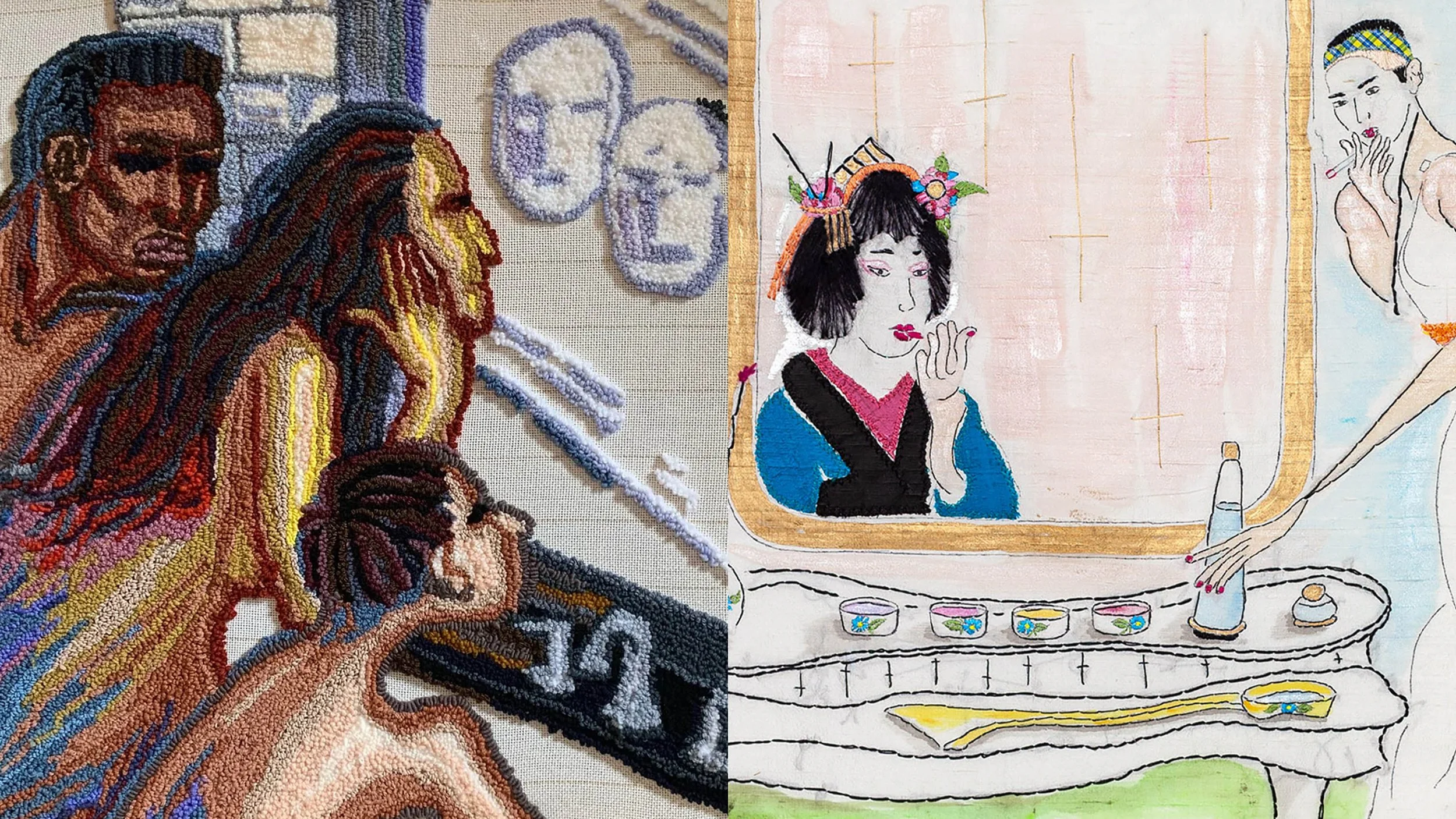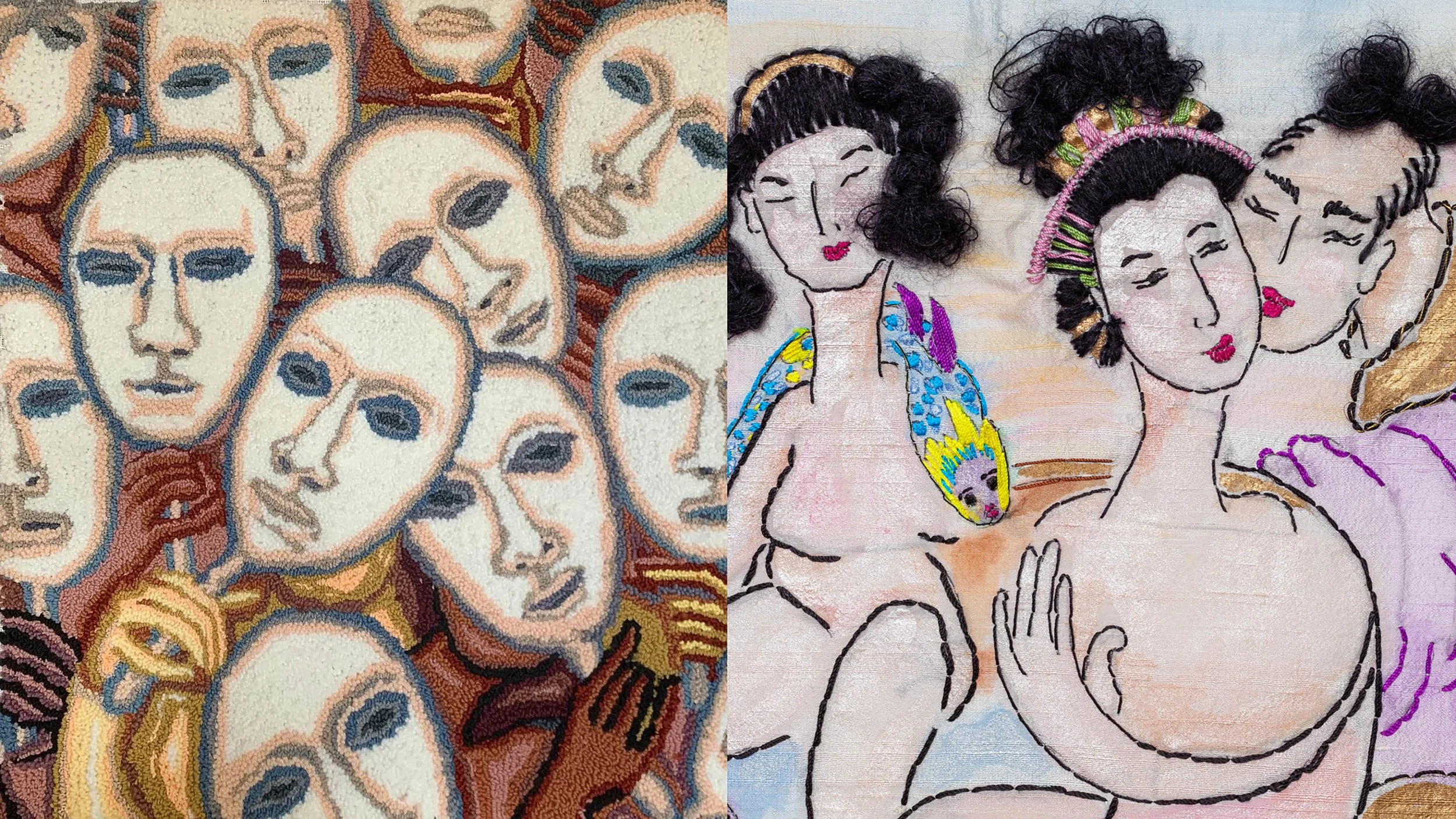Zhen Guo
Carol Scavotto
What Would Your Husband Think?
Thomas VanDyke Gallery is pleased to present What Would Your Husband Think?, an exhibition of work by Zhen Guo and Carol Scavotto. The work of both artists addresses the still-engrained old-fashioned stereotypes and misinformation about what a woman’s role is in modern society. Many people have been educated about gender identity and equality, but still hold jarringly antiquated prejudices about what is right (or wrong) for a woman to do with her life and her body.
The exhibitions’s title What Would Your Husband Think? came out of a series of conversations with both artists where they each revealed they had been asked similar questions when previously displaying their artwork. As a show title, it’s a loaded question, and comes with many of the preconceived notions that the work in the exhibition addresses. This question assumes the person being asked has a husband and that the husband’s thoughts or opinions matter more than those of the person being asked. It infers that there may be consequences for what the person being asked has done, or that they would need the husband’s permission. In a way, the idea of this question being acceptable says a lot about our own society. Even if the question is devoid of judgement about the artist, it has implications about the husband or about the relationship. And it’s not a topic most male artists would ever be asked about, no matter what his wife would think.
The artwork in the exhibition expands on the ideas of the title and openly confronts many issues that women have faced throughout history and still deal with today. Violence, servitude, sexual abuse, judgment, shame, hypocrisy, fear, jealousy, to name a few, are all things that are a regular part of being a woman. Eroticism and sexuality are prime targets for criticism when it comes to being a woman. Non-males are still held to a different standard than males when it comes to being sexual, without considering the person inside the body being criticized.
Zhen Guo (b. 1955) is a Chinese artist who established herself in the 1980s as part of China's emerging art movement, following the tumultuous period of the Cultural Revolution. She moved to New York City in 1986 where she has lived and worked ever since. Guo's art often delves into autobiographical themes, capturing intimate and somber moments from her life with raw honesty and emotional depth. Her works are both compelling and difficult to turn away from.
Guo's artistic style combines psychological realism and personal expressionism. She explores feminist themes through her art, regularly referencing the female body by featuring decorated breasts and other feminine forms. Her work challenges traditional notions of gender and identity, reflecting her experiences as an Asian woman and her journey toward international recognition. Guo's art incorporates vibrant colors and materials, creating a powerful visual impact that addresses equality and cultural differences. Her art is a fusion of personal experience, social commentary, and cultural identity that oscillate between innocence and sorrow, offering a unique perspective on life, love, and the human condition.
Guo’s portrayal of breasts serve as powerful vehicles for her feminist expression and a celebration of gender identity. The work challenges traditional perceptions of women's bodies and the societal expectations associated with them, and puts women's bodies front and center, rightfully proud and unashamed. Guo uses a variety of materials and colors combined with text and drawings to create visually striking and thought-provoking pieces. The breast sculptures, made from highly polished porcelain-like, lacquered papier-mâché fabric, exude a palpable sense of physicality while also veering toward symbolism. They convey an intimate connection to the female form, even as they isolate this body part, evoking a complex range of emotions and responses.
The variously colored, enlarged, and uniquely decorated breasts hang in rows, each with unique shape and size, as is nature. The repetition of the forms creates a mesmerizing and slightly overwhelming effect, emphasizing the corporeal nature of the breasts while simultaneously rendering them abstract. This contrast between the physical and cognitive highlights the tension between societal norms and personal expression. With the nipples standing out prominently on their aureoles, the juxtaposition of hardness and sensuality reinforces the theme of gender identity and challenges the viewer to confront their preconceived notions of the female body.
Guo's art transcends cultural boundaries, as her work combines elements of both Western and Chinese influences. While she acknowledges the Americanization of her artistic psyche, she remains deeply rooted in Chinese culture, evident in her alignment with folk traditions and her choice of colors and patterns.
Guo's exploration of the female form is not limited to mere aesthetics; it is a deliberate and deeply personal statement about the societal roles imposed on women that resonates with their experiences of navigating a world that sometimes seeks to silence their voices. Through her art, she asserts the right of women to publicly identify with their gender in a society that has often objectified and commodified the female body and reminds us that sensuality, when owned by women, can be a source of power rather than vulnerability.
Carol Scavotto (b. 1951) is a multi-disciplinary artist based in Rhode Island, with a diverse artistic practice spanning sculpture, painting, needlework, fine jewelry design, and performance art. Her work is characterized by its autobiographical nature and personal themes. She earned a BFA in sculpture from the University of Massachusetts Amherst in 1972, and was instrumental in the founding of The Springfield Arts Center in Springfield, Massachusetts in the mid 1970s
A pivotal moment in Carol's career came after her successful battle with cancer in 2009, which redirected her artistic focus. She started creating more introspective and socially relevant work, intensifying her artistic practice and gaining recognition for her unique voice.
Her artwork centers on sensuality and its ability to engage an audience in a meaningful dialogue. Being dyslexic, Carol relies on body language and facial expressions to understand people, leading her to explore the subtleties of human emotion. Her background in gymnastics, figure skating, and ballet has deepened her appreciation for the beauty of the human form.
Dolls have been a recurring motif in Carol's work, serving as a non-threatening way to address personal and social issues. Her "Silk Thread Paintings" series, in particular, explores sensuality and female empowerment, challenging societal norms that often objectify and shame women. The series showcases the strength and beauty that can be obscured by self-protection, encouraging individuals to claim ownership of their vitality and beauty.
Carol Scavotto's art is characterized by its deeply personal and introspective themes, as well as its unique use of materials to convey messages of sensuality, empowerment, and self-expression. By using fabric, particularly dupioni silk, as her medium and presenting it as fine art, she challenges the traditionally male-dominated forms of fine art creation. The physical engagement of working with silk complements the narrative of her pieces, often presented as scrolls hanging from teak bars.
Scavotto's process involves creating line drawings of characters, which she then enhances with color and embroidery. Each figure takes on a distinct personality as she interacts with them through the artistic process, resulting in a rich dialogue within the artwork.
Her Asian influence is evident in her work, as she draws inspiration from her mother's collection of art and artifacts from Japan, Korea, and China. The graceful movements of Asian calligraphy and the narrative quality of Japanese woodblock prints have left a lasting impact on Carol’s work.
Carol's artwork has been featured in group shows, solo exhibitions, and art fairs both nationally and internationally.
This groundbreaking 2-person exhibition brings together the thought-provoking artworks of Zhen Guo and Carol Scavotto on the theme of female empowerment through the lens of their artistry, shedding light on the challenges, triumphs, and unique perspectives of women in the world of art.
What Would Your Husband Think? seeks to break down barriers and inspire conversations about what it means to be strong as a woman. The show is an opportunity for discussion and celebration of the transformative power of art in redefining gender roles and encouraging women to embrace their individuality. Scavotto's introspective and sensual artwork paired with Guo's fearless exploration of socially relevant subject matter creates a dynamic narrative of strength, resilience, and self-affirmation. The work being exhibited serves as a testament to the multifaceted nature of the female experience and the pivotal role of women in shaping the future of art and society. Together, their work highlights the diverse ways women can assert their identities, challenge stereotypes, and claim their space in the art world.
Both artists have faced unique challenges in their careers, but their dedication to questioning gender expectations is evident. They have used their artistic voices to address issues of sex, identity, and empowerment. Carol Scavotto and Zhen Guo exemplify the strength and resilience of female artists who refuse to be confined by traditional roles and who use their creativity to challenge and reshape societal norms, fostering a more inclusive and empowering world for women in the arts.






